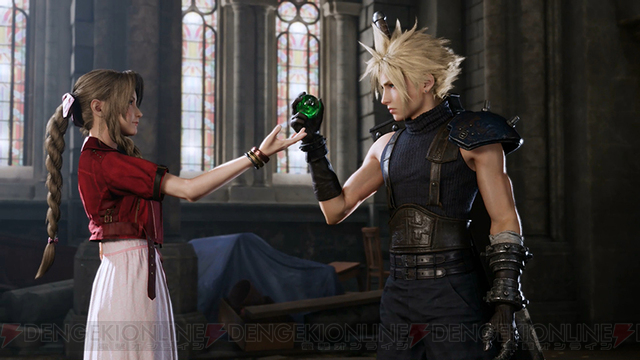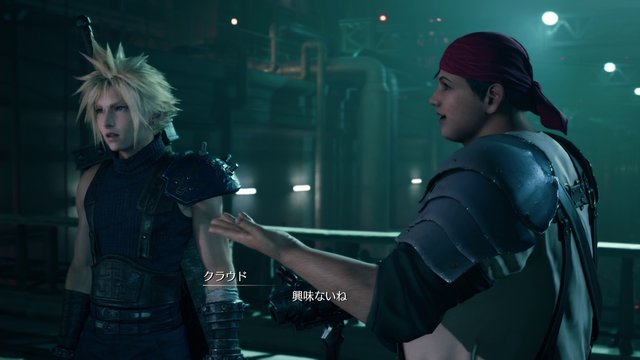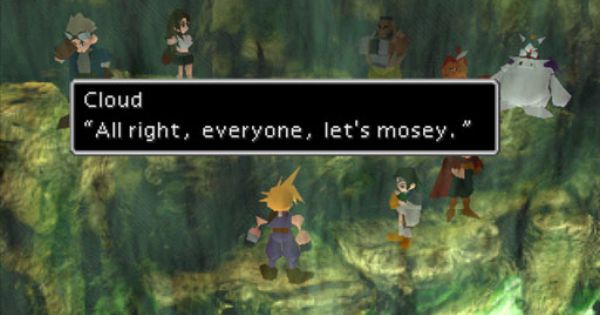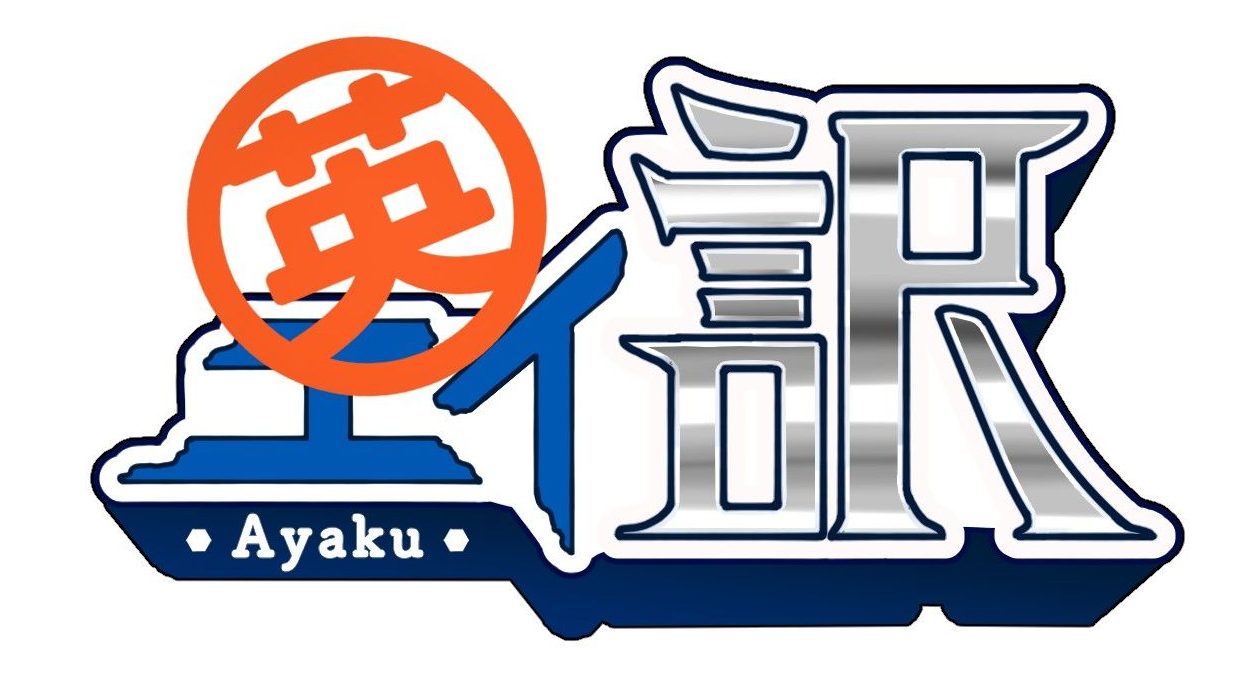
I’ve been seeing comments by Western fans calling the Japanese dialogue “bland.” I disagree.
Let me start off by saying that I love Final Fantasy 7. I’ve played the original game in both Japanese and in English. In fact, I’ve always played my JRPGs in both languages for multiple reasons — to see how the text is localized and to practice reading Japanese. I was very ecstatic to hear that after more than 20 years, Final Fantasy 7 was getting a remake. When Final Fantasy 7 Remake came out last year, I dedicated all my unwanted free time playing the game.
One of the main highlights of the game is seeing all our favorite scenes animated with voice acting. Another highlight is the magnificent English dialogue. Gamers get to not only enjoy a revamp of the original game, but a new localized version of the original script. Even after a year, I come across cutscenes on YouTube that just make me want to watch it because I love them so much.
Reading comments on YouTube has actually made me aware of the opinions regarding the Japanese script or Japanese scripts in general: that it’s bland. You can find some of those comments in the video below.
I love the English localization and the original Japanese dialogue of the remake. I don’t think one is better than the other. However, I disagree with people’s opinions on the latter sounding “bland.”
Not-so-obvious Nuances

The Japanese language has some words and some grammatical constructions associated with men or people with a masculine disposition.
Let’s look at the following sentences:
- このケーキを食べて kono keeki wo tabete
- このケーキを食って kono keeki wo kutte
When translated, both sentences mean “eat this cake” but when you look closely at the last words of each example they’re different.
Example 1 uses fairly standard Japanese. You can add in the -kudasai ending to make it more polite sounding but other than that, it’s pretty plain. Leaving it translated as “eat this cake” would probably work in the end product.
Example 2 uses a masculine version of the verb “to eat”: kuu (this is the dictionary form of kutte). Even though it has the same meaning as the previous example, it’s vulgar in sound and can be used to describe how animals like lions “devour” their food. Nonetheless, there are people in Japan who do use these kinds of words as part of their vernacular, typically young males.
If I were creating a script, I’d probably have a character who is uncivilized in nature use words like this as part of their speech. If I were on the localization team as well, I’d probably have the subtitle read “cram this cake down your throat” IF that’s what the speaker’s intending to say. If kuu is a part of their normal character speech (eg. I’m going to eat my lunch now), it can just be left as “eat” however.
Now let’s look at some in-game examples from the remake.
Cloud’s Catchphrase

Cloud’s catchphrase that’s pretty iconic in both the English and Japanese version of the game: kyoumi nai ne or not interested. While the localized version of the game does convey the main character’s detachment, let’s take a look at why the Japanese line has more pizzazz.
So if I were to write out “I’m not interested” in standard Japanese I would probably use one of the following:
- 興味がありません。 kyoumi ga arimasen
- 興味がないんです。 kyoumi ga nain desu
There’s actually many polite ways to say this in Japanese, but Cloud instead says kyoumi nai ne. He drops the ga particle and adds a ne. This isn’t exactly a golden rule, but the more particles you drop in a sentence the rougher/casual it sounds in tone. I did have to ask a Japanese native consultant familiar with Final Fantasy 7 as to the reason why there’s a ne sentence ender. This is what they said:
「興味ない」、より柔らかい言い方になります。ただ、クラウドの言い方的に差はないです。
It becomes softer in tone than saying just kyoumi nai. However, there’s no difference because of how Cloud says it.
Cloud says it ironically. Like, he’s trying to add a nice layer to his line but because of his tone, that kindness is just not there.
Let’s mosey.

This next example is from the original version released on the Playstation. It’s the part where Cloud tells the party “let’s mosey!,” right before the final battle, causing Cid to get angry at how lame that war cry sounded. In fact, Kotaku’s YouTube Channel released a series talking about the English and Japanese script of the game. You can check it out here.
Anyway!
We learn that Cloud’s character at the beginning of the game is actually a fake persona caused by… a lot of stuff. He’s arrogant and doesn’t care about the well-being of the world. You can say he’s just “not interested.” However, there are moments in the game where we get to see a gentle and vulnerable side of him come out; his true self — particularly through his mannerisms and especially his speech.
At the beginning of this post, I mentioned that the Japanese language has some words and some grammatical constructions associated with men or people with a masculine disposition. Let’s look at two contrasting lines that Cloud has said to help illustrate his made-up masculine voice versus his real persona.
- よし、行くぞ! yosh, iku zo (In-Game Translation: OK! Let’s go!)
- よし、行こうよ、みんな!yosh, ikou yo, minna! (In-Game Translation: All right, everyone, let’s mosey)
Both examples mean “alright, let’s go” but have different nuances. Cloud uses the first example throughout the beginning of the game where he’s still arrogant and proud. Characters who use iku zo are assertive and confident (not to mention manly) in their actions; fitting if you ask me.
Before the final set of fights, Cloud says example two to the party: ikou yo. This type of speech pattern fits Cloud’s gentle and vulnerable disposition. While it’s not as assertive and masculine as the previous example, it’s definitely way softer in tone while still trying to be commanding.
Lost in Translation
Cloud actually said ikou yo earlier in the original game. In fact, he says it right after he tells the group that there is another person residing in him right after Aerith’s death. However, the original translation translated it as “let’s go” instead of “let’s mosey,” as seen later in the game. Therefore, a lot of fans couldn’t experience the “wait, what did Cloud just say?” in the English version.
Speech pattern in Japanese, like different verbs, word choices, and sentence enders, can be used to illustrate a character’s development throughout the series. These subtle expressions can get lost in translation, which is what happened in the release of the original game back in 1997. Sentence ending particles and verb inflections can carry a lot of emotion, and it’s up to translators to localize these kinds of dialogues properly.
When Final Fantasy VII Remake was announced, the localization team was given another chance to remake the script. The team utilized the many different expressions the English language has and incorporated that into the script of the game as part of their localization process. The characters sound more Western, if that makes any sense. And I think that’s what makes the dialogue so likable and different.
The Japanese dialogue is full of exciting characterization that can only be noticed if you’re studying or know the language. It only seems bland. The English version of the remake is full of English expressions that caters to the Western audience in order to convey the characterization seen in the Japanese script.
Related Reading:
- Fruits Basket – How Ayame Switches Up his Speech Pattern
- Your Name – The Analysis of the Hidden Poem on the Chalkboard
- What English Goku Can’t Convey About Japanese Goku

